
What peoplevalue predicts what they will remember and do
Value Measurement captures what brains truly value in real-time. The data let you forecast what people will remember and the choices they'll make with stunning accuracy, so you can create extraordinary experiences every time.
The future is tracking what people value in real-time, on an unconscious level, as experiences and content unfold. Outcomes are the key. Value Measurement directly influences the choices people make. This is the revolution: accurately predicting outcomes by measuring what brains value.
Value Measurement reveals in-the-moment impact of any experience, event, or piece of content at an unconscious and unbiased level to do a single thing: predict outcomes. It's not what people say they feel, want to feel, or intend to do - these are all subjective and loaded with bias.
Value Measurement removes this bias, replaces self-report, and eliminates the subjective in order to effectively influence behaviors and drive extraordinary outcomes every time.
Break Free From Flawed Feedback
THE PEAK/END PROBLEM
Traditional customer feedback methods, such as surveys and NPS or CSAT ratings, capture single moments in time when people reflect on something that already happened. This data is misleading because people only remember the peak and end points of an experience, rather than the overall journey.
As a result, focusing solely on these single-point self-report tools may lead to a distorted understanding of customer satisfaction and preferences. Worse, only very happy or very unhappy customers complete surveys, further biasing results.
To truly understand each touchpoint and the entire customer journey, their entire experience must be measured moment-by-moment, in real-time.
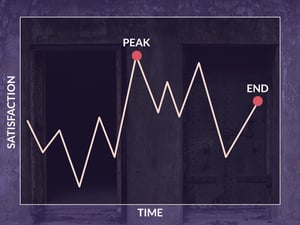
FEEDBACK IS PERMANENTLY BROKEN
The rise of AI, automated survey bots, and fake responders, has created increasing concern about the reliability of self-report data.
Additionally, an ever-growing army of “professional survey takers” are gaming the system, reducing sample quality, and demolishing data integrity.
These developments, coupled with the potential for manipulation of metrics like NPS and CSAT, drastically distort the accuracy of feedback and insights derived from such tools.

START MEASURING WHAT ACTUALLY MATTERS
Neuroscience techniques that claim to measure emotion—like those analyzing electrical activity in the brain or facial expressions—are grounded in outdated science, often confined to lab settings, and fail miserably at predicting real-world behavior.
Predicting outcomes is the entire reason we created Value Measurement. More than 20 years of peer-reviewed scientific research, millions of dollars of R&D, and 7 years of client success stories prove the scientific efficacy and accuracy of our approach.


THE GLOBAL IMPACT IS STAGGERING
VALUE MEASUREMENT
VALUE MEASUREMENT continuously measures what people unconsciously value, in-the-moment, during any experience. Value Measurement strips away the bias and BS, tracking what resonates as events unfold in real-time.
Using smart watches and fitness sensors that people wear every day, our proprietary algorithms infer the release of dopamine and oxytocin from the brain, allowing us to accurately measure the moment-by-moment unconscious value people get from any experience.
VALUE SCORE is the robust and repeatable metric for what brains love using an easy-to-understand 0-100 scale. By quantifying the unconscious impact of an experience, the Value Score has been shown to predict memory and behavior with 85-98% accuracy.
VALUE MOMENTUM is the overall shape and direction that your experience created for individuals. Discover whether you took them on the intended journey and gain the clarity to ensure your vision delivers desired outcomes.
KEY CHARACTERISTICS OF VALUE MEASUREMENT
In order to truly measure what a people's brains unconsciously value, any solution must meet these criteria:
PREDICTING OUTCOMES, FINALLY
For decades, companies, brands, and creators have struggled to predict outcomes, hindered by inadequate tools. With Value Measurement, everything changes.
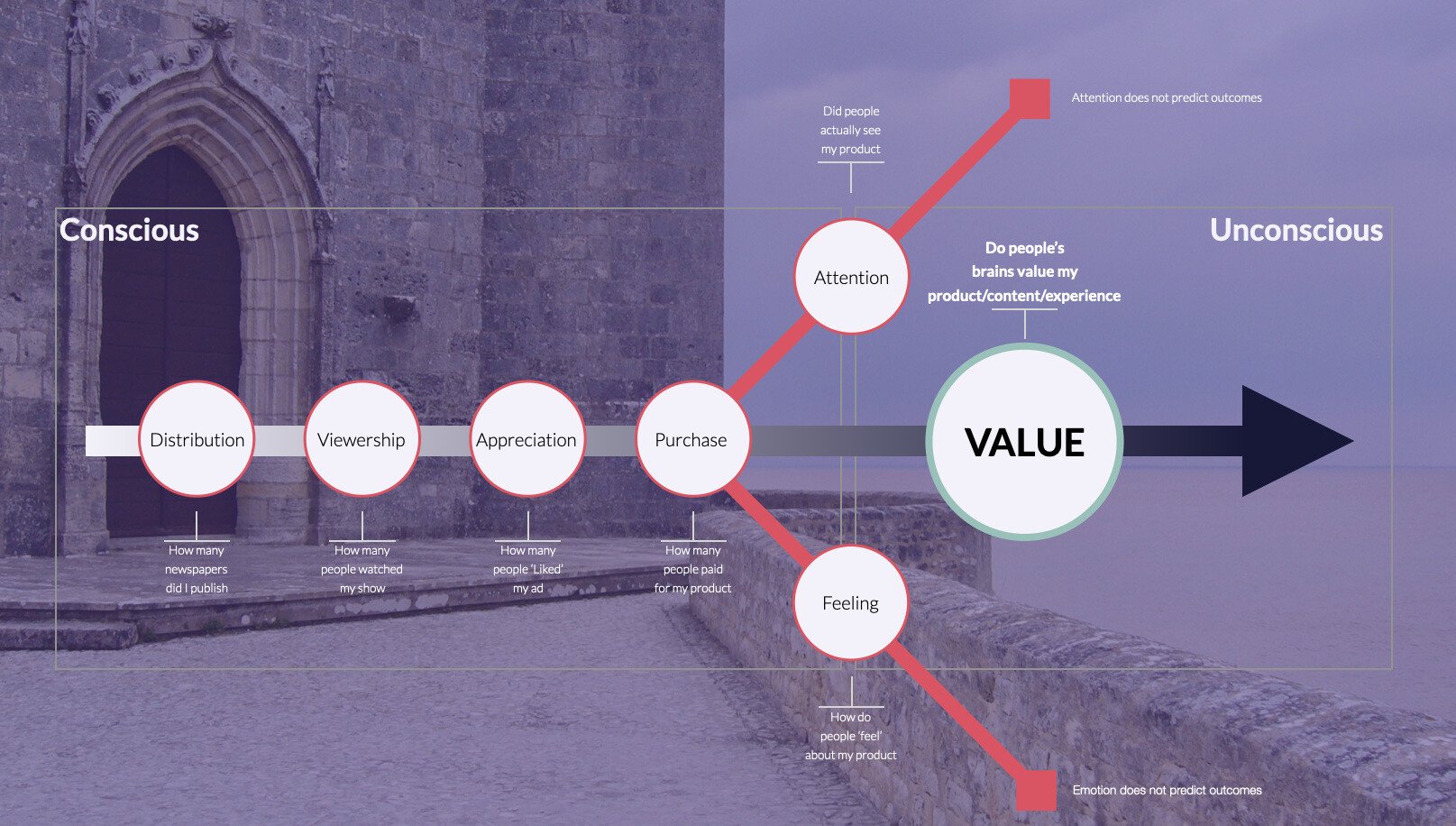





THE VALUE MEASUREMENT MANIFESTO
Say goodbye to feedback filled with bias and bullsh*t, say hello to predicting the future with Value Measurement.
Download the Value Measurement Manifesto and join the movement today.
IT'S A CHOICE NOT A COMPARISON

Value Measurement vs. Self-Report
Do surveys, net promoter scores (NPS), and CSAT measure value?
No. Self-report surveys—including NPS and CSAT—based on "feeling"or "intent" are inherently biased and poorly predict behaviors. If surveys worked, we'd never have bad movies, TV, and ads, or failed immersive experiences.
Thus, surveys and self-report are not Value Measurement.
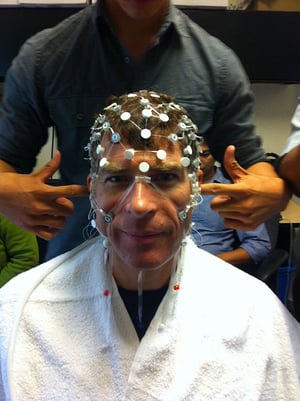
Value Measurement vs EEG
Does EEG (electroencephalogram) measure value?
No. In a lab setting, and with enough sensors, EEG can detect and measure surface electrical activity of the brain that may be linked to feelings.
However, this output is not designed to correlate to future behavior and does so with low accuracy. Value Measurement is designed from the ground up to accurately predict behavior.
Thus, EEG is not Value Measurement.
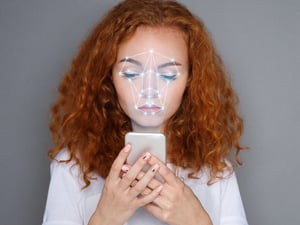
Value Measurement vs Facial Coding
Is facial coding or facial recognition value measurement?
No. The consensus in published science shows that facial expressions do not correlate to unconscious emotional states.
And even if they did, facial coding does not predict behavior, because it wasn't designed to.
Thus, facial coding is not Value Measurement.

Value Measurement vs Biometrics
Do biometrics measure value?
No. Raw biometrics like skin conductance, heart rate, and heart rate variability (HRV) measure arousal responses, but arousal is only a small part of what influences behavior.
These data do not predict meaningful behavior.
Thus, raw biometrics are not Value Measurement.
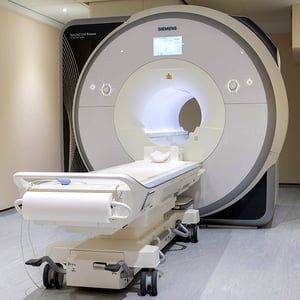
Value Measurement vs fMRI
Does fMRI (functional magnetic resonance imaging) measure value?
No. In a lab setting, fMRI can detect and measure the blood flow to different parts of the brain that may be associated with an emotional state.
However, fMRI is not designed to predict behaviors.
Thus, fMRI is not Value Measurement.

Value Measurement vs. Attention Tools
Does attention measure value?
No. Tools like eye-tracking designed to measure visual attention and other measures of attention only capture a small part of what brains value.
Importantly, attention measurement poorly predicts actions.
Thus, attention measurement is not Value Measurement.
READY TO JOIN THE VALUE MEASUREMENT REVOLUTION?
Are you ready to unleash the power and maximize impact by becoming a trailblazer in the Value Measurement revolution? Are you excited to learn more about how you can create content and experiences that are guaranteed to deliver success? Drop us a line and we'll share more information!
In the meantime, click the 'Try Now' button at the top of the page to get a free Value Measurement score for your content or experience!

FEELS LIKE IT'S PURE MAGIC
BECAUSE IT'S GOOD SCIENCE
Your brain tells a story. Your smart watch is ready to listen. After more than 20 years of published, peer-reviewed research, we’re connecting the two. Now, using everyday wearable devices to capture activity within the body, we can measure the brain's value network throughout the day. Our sophisticated algorithms give you all the information you need to understand and act on the highest-value moments.

